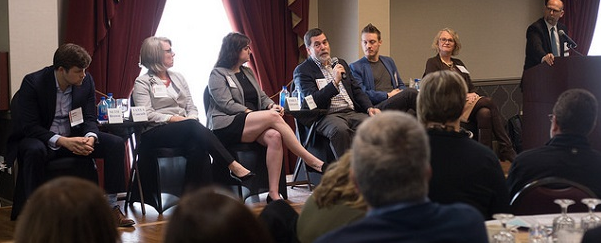Symposium on investing in Appalachia draws over 100 stakeholders to discuss possibilities for regional impact
Earl Gohl, the attending federal co-chair of the Appalachian Regional Commission (since retired), often noted, “Appalachia is the next great investment opportunity in America.”
That sentiment--coupled with the idea that investment can produce positive social change--brought together investors and service providers from across Appalachian Ohio and West Virginia in March for a symposium on “Investing in Rural America.”
Organized by the ARC-funded Social Enterprise Ecosystem program at Ohio University’s Voinovich School of Leadership and Public Affairs, the conference provided an opportunity for active and potential regional investors to engage one another in extended conversations about enhanced and more effective collaboration.
The day began with a keynote presentation by Jenna Nicholas, an expert on impact investment and the CEO of Impact Experience, a company that helps build lasting relationship between investors, philanthropists, innovators and community leaders.
“Impact investment requires us to engage stakeholders from marginalized communities in the decision making process around capital allocation in order to ensure that investors are not simply extracting and profiting from the region but are instead working to promote wealth regeneration within communities,” Nicholas said.
In Appalachia, a grassroots approach would mean retraining former coal miners for new career opportunities, delivering greater resources to minorities and women, promoting businesses that address health disparities and more, Nicholas said.
After Nicholas’s presentation, a panel of regional impact investors and stakeholders expanded on the topic. The panel featured Tanya Conrath, associate director of Ohio University’s Innovation Center; Ben Lachman, the co-founder of an Athens-based social enterprise; and four senior staffers from impact funding institutions active in Appalachia. These senior staffers included Teri Lovelance, president of LOCUS investing; Peter Hille, president of MACED; Seth Brown, senior associate with Quantified Ventures; and Emily Edwards, senior associate with Village Capital.
The panelists offered examples of successful impact investment and social enterprise. Brown detailed his firm’s investments in mountain biking trails throughout Wayne National Forest, which deliver both environmental and health benefits to the population and create financial returns by resulting in increased visitation and tourism. Lachman spoke about his company’s product, Glow, which helps people manage their home energy use to lower their utility bills and protect the environment.
Panelists also shared lessons derived from their experiences in impact investment. Edwards pointed out that marginalized communities represent overlooked investment opportunities. Hille stressed that although returns on socially sound investment will often be modest, the investments will generally be low risk. Finally, Lovelance encouraged investors to connect with local communities in order to determine the most impactful investment opportunities.
Conrath summed up the general ethos of the panelists: “I’m committed to ensuring that there is a thriving local economy, not just for my kids but for everyone’s. There are no superheroes coming to save us – we are the ones we’ve been waiting for.”
Later in the day, breakout sessions focused on participant-selected topics. These included developing relationships between West Virginia foundations; exploring replicable business models in southeast Ohio; building relationships between entrepreneurs and funders; connecting investors to support and consulting services; and developing an angel fund, or investment network, in the Appalachian Ohio region.
Those sessions are yielding concrete next steps. Discussions are underway to create new avenues of financial support for early-stage social impact efforts, and a committee is organizing a second symposium to continue collaborations and hone approaches to attract capital to the region.
It was the region’s commitment to action that led Ray Daffner, the ARC’s entrepreneurial development manager, to conclude that the region represented at the symposium is uniquely poised for change.
“It is self-evident that there is a network and ecosystem of people in this region between the University, nonprofit organizations, for-profit organizations, investors and philanthropists that is very strong,” Daffner said. “It is rare that we see a rural region with this kind of capacity and with people of this level of expertise who want to work together. These folks are ready to make things happen.”
To wrap up the conference, the technical director of the Voinovich School’s Social Enterprise Ecosystem program, John Glazer, pointed toward the future.
“We are at the frontier of something emerging,” Glazer said. “We will change the way in which resources get allocated and decisions get made.”
Faith Knusen, the director of the Social Enterprise Ecosystem program who played a leading role in organizing the symposium, said the day had been an immense success.
“Getting all of these key players in a room together to meet one another, talk about enhancing capital access for social enterprise and form concrete next steps has been extremely important,” Knutsen said. “I think the organizing committee’s aspirations were met, and we look forward to the continuing conversation.”
In addition to the Voinovich School and the ARC, the conference was sponsored by the Foundation for Appalachian Ohio, Rural Action, the Athens County Foundation, the Parkersburg Area Community Foundation, the Sugar Bush Foundation and Sugarbush Valley LLC.
